Brian Gormally (Committee on the Administration of Justice)
Violent political conflict always means a bonfire of human rights. Conflict on this island has been no exception. Amidst many atrocities committed by state and non-state actors, my organisation, the Committee on the Administration of Justice (CAJ) was founded in 1981 to keep the hope of a human rights based future alive. The Belfast Good Friday Agreement contained many commitments on rights and equality and, in practice, has led to over two decades of relative peace. In these circumstances, the first priority of a human rights activist is to defend the peace.
That is why we opposed Brexit. It threatened the peace process through removing the common bond of EU law and its equality provisions, weakening the practical equality between Irish and British citizenship, undermining the principle of self-determination and creating division through the xenophobic character of the referendum campaign and subsequent negotiations. Most important, it threatened a hard border across the island of Ireland.
This would have been, and still could be, disastrous. The border during the troubles, with its cratered roads, destroyed bridges, watchtowers on every hill and lengthy and often abusive checks on travellers, marked both the symbol and the reality of conflict. The free movement of 30,000 vehicles and 100,00 people a day across an invisible border, marks the symbol and reality of peace. Restoration of any kind of controls on the land border would directly threaten commitment to the peace process.
The Protocol, expressed in UK-EU treaty and domestic legislation, was explicitly designed to avoid that result. More than half of the paragraphs of the explanatory preamble deal with matters such as avoiding a hard border, stressing the importance of North-South cooperation, the all-island character of the peace process and the importance of maintaining the integrity of the Good Friday Agreement. It therefore creates a special regulatory regime for Northern Ireland which allows it to be part both of the EU Single Market and the UK customs area. It also provides for no diminution in the human rights and equality provisions of the Agreement and for the continued application in the North of key EU equality laws and directives.
The Protocol does mean that there must be some control of goods flowing from Britain to Northern Ireland as they thereby enter the EU Single Market. However, the impact of those controls depends on the extent to which the UK wishes to depart from food safety and other regulatory good practice of the EU and its willingness to negotiate practical arrangements in good faith. In fact, there have been threats by the UK side to breach the Protocol, and hence international law, and they have conducted negotiations in a toxic atmosphere of xenophobic propaganda.
There have been minor disruptions to the supply chain and the availability of some foodstuffs; though that is often the result of British companies not bothering to make the necessary special arrangements for supplying the small market of Northern Ireland. It is also important to remember that there have always been controls on, for example, the export of live animals from Britain to Northern Ireland, as the island has always been one unit for some health and safety regulation. Furthermore, until the late seventies, people from Britain wanting to work in Northern Ireland had to have a government-issued employment permit – a much bigger control than any envisaged by the Protocol.
The regulation of trade required by the Protocol takes place in selected ports and airports and is invisible to most travellers; there is no disruption to daily life and no threat to the economy. Indeed, wide sectors of industry are starting to appreciate the opportunity in being part of both the EU and the UK economies. Yet some argue the Protocol interferes with the constitutional integrity of the UK and hence breaches the Good Friday Agreement.
In fact, there is no threat to the sovereignty of the UK – the Union Flag flies over public buildings and the present government leaves no-one in any doubt which Parliament has total sovereignty over Northern Ireland. The Agreement is very clear that there are only two constitutional futures possible for Northern Ireland: remaining part of the UK or becoming part of a united Ireland. The latter cannot happen unless and until a majority of the people of Northern Ireland and a majority in the South express support for a change. “The consent, freely and concurrently given, North and South, to bring about a united Ireland, if that is their wish, accepting that this right must be achieved and exercised with and subject to the agreement and consent of a majority of the people of Northern Ireland;” is the way the Agreement formulates it.
Nothing could be clearer, and the courts have recently found that the Protocol in no way breaches the Agreement. The argument that the Agreement is somehow undermined by the Protocol is a factitious attempt to propose an external cause for existing political insecurity and uncertainty.
The Protocol would not have been necessary if it had not been for Brexit. It is an imperfect solution to a problem unnecessarily created. It does, however, avoid the crippling blow to the peace process that a hard land border would represent, and it does contain special measures to protect human rights and equality. Until someone suggests a better solution, then, defending the peace in the interests of human rights demands support for the Protocol.
Brian Gormally is Director of the Committee on the Administration of Justice (CAJ), Northern Ireland’s leading human rights NGO.
The views expressed in this blog reflect the position of the author and not necessarily that of the Brexit Institute Blog.



